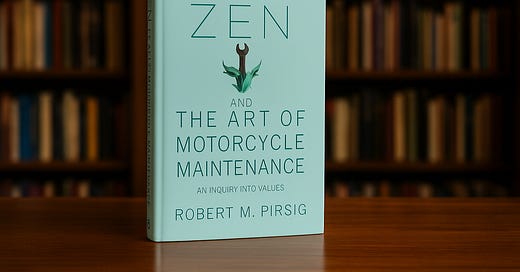Zen and the Art of Motorcycle Maintenance: An Inquiry Into Values
What if quality was the foundation of everything?
The book in three sentences
A father and son motorcycle trip becomes the canvas for a philosophical deep dive into the nature of Quality.
The narrative oscillates between the road and the mind, blending storytelling with an inquiry into values, meaning, and madness.
At its core, it’s a guide to living with care — integrating rational analysis and romantic intuition as one unified way of being, which reminds me of Product.
Why I Picked It Up
I first came across this book during my days as a mechanical engineer, when my world revolved around tolerances and inspections. I remembered it as dense — even intimidating.
Years later, after stumbling upon references to the book on Lenny's podcast, I picked it up again, now working in the digital space of Product — still solving problems, still thinking in systems, but through a completely different lens.
And here are three reflections that stayed with me:
Quality Comes Before Definition
The Mechanical Is Spiritual
Classical Meets Romantic
Quality Comes Before Definition
Before you can measure, define, or optimize anything, you feel its quality.
That feeling of “rightness” is the seed of good product decisions. It’s not irrational. It’s pre-rational. Learning to trust that sense, that Product intuition, and then validating it is part of mastering the craft.
In Zen, Pirsig assigns his English students the task of writing about “what is quality?” Most of them freeze. Not because it’s too abstract, but because it’s too familiar. They know what quality is — they feel it every time they read something good or bad — but they can’t define it. The moment they try to pin it down, it slips away.
That’s the point. Quality isn’t born from the definition. It’s revealed through experience.
Product people chase the same thing. A flow that just works. A design that feels frictionless. A release that clicks. We sense quality before we can articulate why it’s there.
The Mechanical Is About Care
One of Pirsig’s most vivid contrasts is between himself and his friend John, who rides a sleek BMW but wants nothing to do with maintenance. John just wants the machine to work. He avoids the details, dreads the thought of opening up the bike, and resents any breakdowns. For him, the machine is a black box — something to be used, not understood.
But Pirsig sees the opposite: real peace of mind comes from engaging with the machine, not ignoring it. From paying attention. From care.
Peace of mind isn’t at all superficial, really. It’s the whole thing. That which produces it is good maintenance; that which disturbs it is poor maintenance.
Product work has the same shape. You can either patch things blindly — or take the time to understand how the system works. Real builders don’t just want things to run. They want to know why they run, and how to make them better.
Care is not extra, it is the work.
Classical Meets Romantic
Zen is a book about a breakdown — intellectual, emotional, and philosophical. And at the heart of that breakdown is a split: the classical mindset that dissects and explains vs. the romantic mindset that experiences and appreciates.
Pirsig doesn’t tell us to pick one. He illustrates what happens when you fail to integrate the two, which applies to the Product world.
Strategy is worthless without taste. Design is fragile without structure.
The real craft is holding both, even when they pull against each other. Knowing when to analyze and when to feel. When to break something apart and when to step back and see the whole.
Most teams lean one way. Great teams hold the tension and build something better from it.
A Note from Me
In mechanical engineering, I was trained to eliminate error. In Product, I’ve learned to embrace uncertainty — and still move forward with care.
To me, product management is a discipline of attention. A commitment to listen, to inspect, to integrate — and above all, to pursue quality before we even try to define it.
What to Read Next
Check the summary for The Mom Test, the most recommended Product book.
You look at where you’re going and where you are, and it never makes sense, but then you look back at where you’ve been, and a pattern seems to emerge.




